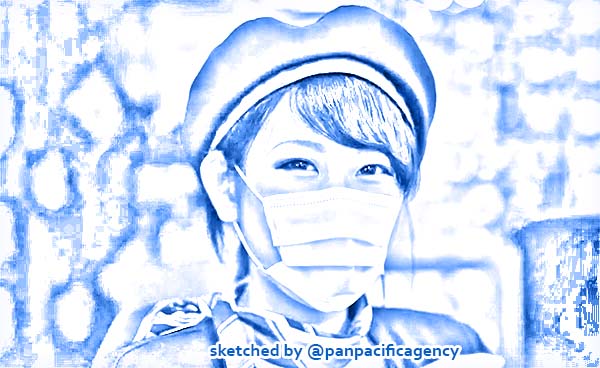CSOs call on Cambodia’s govt to scrap public order draft law

An Asian woman wears a surgical mask, a practice widely seen in East Asia well before the coronavirus pandemic. Photo: Facebook. Sketched by the Pan Pacific Agency.
PHNOM PENH, Aug 31, 2020, Khmer Times. Thirty-six civil society organisations have signed a joint statement calling for the government to scrap the public order draft law (PODL). The statement, issued on Thursday, follows an initial appeal made on August 13 by 65 CSOs for the government to discard the PODL and uphold its obligations under international human rights law, Khmer Times reported.
The statement said: “We call on the Cambodian government to immediately discard the PODL. Instead of drafting this law, the government should urgently prioritise the prevalent gender discrimination identified by organisations in this country – including gender-based violence and discrimination across education, economic, social and political participation through legislative reforms and policy change”.
The statement said the PODL undermines women’s freedom of expression, reinforces harmful gender stereotypes and discriminates against at-risk groups in society.
“The government cannot combat the high rates of sexual violence and harassment witnessed in Cambodia without assuring that any law puts women in control of their bodies and their own sexual autonomy. The law must condemn and prosecute perpetrators of all forms of sexual violence, as recommended by a CEDAW committee in 2019 following thorough observation regarding this matter,” the statement said.
“The PODL indicates that the government has failed to conduct an assessment of the draft law’s negative impact on women and
the rights of women it endangers, contrary to CEDAW recommendations,” it added.
Ouk Kim Lek, a ministry secretary of state at the Interior Ministry, yesterday declined to comment on the statement.
Bunn Rachana, executive director of Klahaan Organisation, one of the organisations which signed the statement, said yesterday: “Some of the articles in the PODL are unnecessary as there is already a Criminal Code which covers some of the issues, such as public indecency.”
“One of the articles listed, seeks to define law around speaking too loudly. However, if a woman who is subject to domestic violence screams out for help for example, will she be breaking the law? It is too ambiguous,” she said.
“As an organisation that works on the issues that women face, we are well aware that public sexual harassment is a huge problem in Cambodia, yet the draft law doesn’t even touch on it and instead focuses on smaller, less relevant issues,” she added.
“The law also doesn’t address discrimination against same-sex couples. This is another priority overlooked by the PODL,” said Rachana.
Executive director of the Cambodian Centre for Human Rights Chak Sopheap previously said: “National tradition and dignity are not a satisfactory basis for law and do not meet international standards.
“The draft law currently lacks clarity and leaves citizens unable to determine what activities are prohibited. It is far too ambiguous and open to interpretation,” he added.
The draft law on public order consists of eight Chapters and 48 Articles that outline the criteria for what it calls “public order”, which includes laws on tradition, security and image.